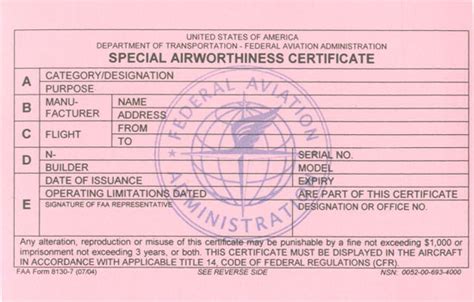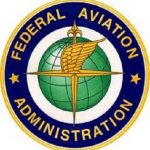Are you considering purchasing or do you own an aircraft with an experimental airworthiness certificate? If so, it is important that you understand the limitations that go along with that type of aircraft. While some limitations are familiar, others are not as well known. However, failure to comply with any of the limitations applicable to the experimental aircraft you operate could result in adverse consequences for the pilot/operator, aircraft owner, and/or aircraft certificate.
Experimental Certificate Purposes
14 C.F.R. § 21.191 allows the FAA to issue an experimental airworthiness certificate for an aircraft for one or more of the following purposes:
-
Research and development.

-
Showing compliance with regulations.
-
Crew training.
-
Exhibition.
-
Air racing.
-
Market surveys.
-
Operating amateur-built aircraft.
-
Operating primary kit-built aircraft.
The FAA will also issue operating limitations specific to each purpose for which the experimental certificate is issued. Section E of FAA Form 8130-7, Special Airworthiness Certificate specifies that operating limitations issued with a certificate are part of that certificate. Likewise, 14 C.F.R. § 91.319 requires that any person operating an aircraft issued an experimental certificate must comply with the aircraft’s operating limitations.
Further, 49 U.S.C. § 44711(a)(l) states that “[a] person may not – (1) operate a civil aircraft in air commerce without an airworthiness certificate in effect or in violation of a term of the certificate.” Since the operating limitations issued for the aircraft are considered part of its airworthiness certificate, operation of the aircraft in contravention of its operating limitations would also be a violation of this statute.
Experimental Certificate Limitations
So, what can you do with an aircraft that has been issued an experimental airworthiness certificate? For starters, FAR 91.319(a) states that the aircraft may only be operated in a manner that is consistent with the purpose(s) for which the certificate was issued.
FAR § 91.319 provides additional limitations.
Compensation or Hire. For example, an experimental aircraft may not be operated to carry persons or property for compensation or hire. However, one limited exception to this prohibition allows an experimental aircraft operator to tow a glider that is a light-sport aircraft or unpowered ultralight vehicle.
Additionally, keep in mind that the FAA draws a distinction between an operation for compensation or hire when it involves the transportation by air of persons or property of another, versus when it involves the transportation of the operator’s employees or property. Flights carrying only the operator’s “own” employees who are necessary for the purpose of the flight are not considered flights for compensation or hire.
For example, operation of a company-owned aircraft by a single pilot employed by the company carrying property owned by the company would be permitted. In this instance the company would merely be operating the aircraft “incidental to its business” rather than for compensation or hire. But if the company were to carry persons or property “of another” and receive compensation that operation would be a violation of FAR § 91.319(a)(2).
Also, after recent regulatory revisions, effective December 1, 2024 an experimental aircraft may now be used to conduct flight training, checking or testing in accordance with the requirements of 14 C.F.R. § 91.326(c):
-
The authorized instructor is not providing both the training and the aircraft;
-
The aircraft is not advertised or broadly offered as available for flight training, checking, or testing; and
-
The only compensation that may be provided for use of the aircraft is the expenses for owning, operating, and maintaining the aircraft. Compensation for profit is prohibited.
While the FAA still views flight instruction as an operation that is conducted for compensation or hire (another discussion for another day), the new regulation now provides an exception to that prohibition. Additionally, for those to whom a LODA (as discussed below) was previously issued for flight training, FAR § 91.326(d) permits continued operation consistent with the LODA through December 1, 2026, subject to FAA’s authority to cancel or amend the LODA at any time.
Additional Limitations. Another limitation prohibits operating an aircraft with an experimental certificate over a densely populated area or in a congested airway unless the FAA otherwise authorizes those operations in the aircraft’s operating limitations.
Experimental aircraft operators also need to:
-
advise each passenger of the experimental nature of the aircraft;
-
operate under VFR, day only, unless the FAA authorizes night VFR or IFR flight; and
-
notify the control tower that the aircraft is experimental when operating into or out of airports with operating control towers.


 (“LODA”) providing relief from the limitations imposed on experimental aircraft. An applicant for a LODA must submit a request to the FAA at least 60 days before the date of intended operations with a complete description of the proposed operation and justification that establishes a level of safety equivalent to that provided under the regulations for the deviation requested. The FAA has discretion to approve or deny a LODA and, once issued, the FAA may cancel or amend the LODA at any time.
(“LODA”) providing relief from the limitations imposed on experimental aircraft. An applicant for a LODA must submit a request to the FAA at least 60 days before the date of intended operations with a complete description of the proposed operation and justification that establishes a level of safety equivalent to that provided under the regulations for the deviation requested. The FAA has discretion to approve or deny a LODA and, once issued, the FAA may cancel or amend the LODA at any time.